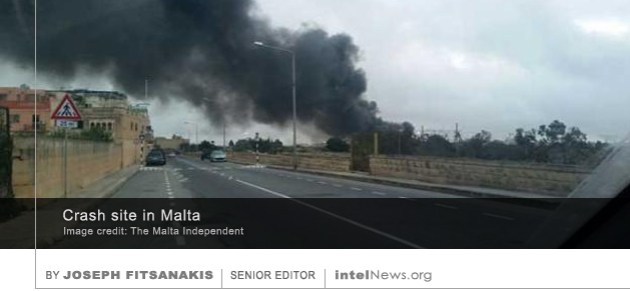French citizens killed in Malta plane crash were intelligence officers
October 27, 2016 1 Comment
 Despite initial denials, it appears that at least three of the five French citizens who were killed in an airplane crash in Malta earlier this week were employees of the country’s external intelligence agency. The crash happened in the early hours of Monday near the village of Luqa in southern Malta. Early reports identified that the plane as a light aircraft and was carrying five French citizens when it crashed, shortly after taking off from the nearby Malta International Airport. Initial statements from Maltese and French government officials said the plane was on a local flight route and had not been scheduled to land outside of the Mediterranean island. The five passengers were identified in press statements as “customs officers” who were conducting a joint project with their Maltese counterparts.
Despite initial denials, it appears that at least three of the five French citizens who were killed in an airplane crash in Malta earlier this week were employees of the country’s external intelligence agency. The crash happened in the early hours of Monday near the village of Luqa in southern Malta. Early reports identified that the plane as a light aircraft and was carrying five French citizens when it crashed, shortly after taking off from the nearby Malta International Airport. Initial statements from Maltese and French government officials said the plane was on a local flight route and had not been scheduled to land outside of the Mediterranean island. The five passengers were identified in press statements as “customs officers” who were conducting a joint project with their Maltese counterparts.
Subsequent reports in the French media, however, said that at least three of the five French passengers who perished in the crash were officers of the General Directorate for External Security, France’s external intelligence agency, which goes by the initials DGSE. It is also believed that the airplane was registered in the United States and was operated by a Luxembourg-based company. Reports from Libya state that the plane’s mission is “shrouded in mystery”. Some articles suggest that it was heading to the city of Misrata in northern Libya, or that it may have been conducting a reconnaissance operation over the Mediterranean, aimed at gathering intelligence on smuggling activities originating from Libya.
The French intelligence services are known to be active on the ground in Libya, where several Sunni Islamist groups, including the Islamic State, control territory. In July of this year, Paris acknowledged for the first time that it had Special Forces and intelligence operatives in Libya, after three DGSE officers were killed in a helicopter crash in the North African country. The latest air crash was not preceded by an explosion, according to French media. The French government has launched an investigation into the incident.
► Author: Joseph Fitsanakis | Date: 27 October 2016 | Permalink







French leftist newspaper Liberation cited an unnamed “expert in Libyan affairs” who claimed that “Malta is the backroom base for all Libyan operations. The French, the English, the Italians, the Americans … everybody is there.”
The unnamed source, who described Malta as “the Casablanca of the 40s”, was quoted by Alternattiva Demokratika chairman Arnold Cassola in a Facebook post he titled ‘French newspaper speculations’.
Four hours after the fatal crash at Malta International Airport, the Maltese government said that the plane was being used for a surveillance operations by French Customs and that it had been going on for five months.
Prime Minister Joseph Muscat said in Parliament later that the government had based its statement on the official documentation submitted by the French authorities.
French Customs said that none of its personnel had been on board the plane.
Meanwhile, the burnt remains of the Fairchild Metroliner Mark III aircraft were yesterday still strewn across the road on the periphery of Kirkop, just past the airport perimeter fence as investigators continued to probe the cause of the accident.
The plane was registered in the US and leased by Luxembourg-based CAE Aviation, a private contractor used by various law enforcement agencies to conduct surveillance operations.
Two of the victims, both pilots, were CAE employees.
The small plane smashed into the ground soon after having taken off, exploding into a ball of fire upon impact.
Francis Saliba MD Ronnie Callus 19 hours ago
Kindly stop speculating and attributing false motives to anxious Maltese legitimately concerned about the use of Malta by international criminal organisations using Malta for the illicit traffic in human beings, drugs and armaments.